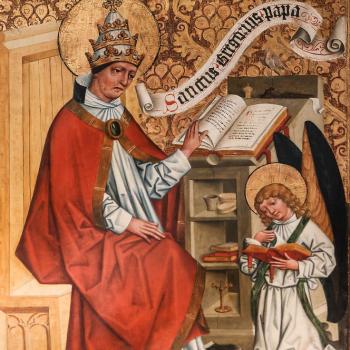
This is one of a series of my reviews of the book by prominent Catholic journalist, editor, and author Philip Lawler, entitled Lost Shepherd: How Pope Francis is Misleading His Flock (due to be released on 26 February 2018). Phil was kind enough to send me a review copy, and he and others have encouraged me to read the book and review it. Their wish is granted!
For background, see my paper, On Rebuking Popes & Catholic Obedience to Popes, and three posts concerning a few statements from the book that I found very troubling and questionable, including dialogues with both Karl Keating (who positively reviewed it) and briefly with author Phil himself (one / two / three).
*****
The Introduction (as it should) provides a very meticulous summary of Phil’s general outlook: to be explicated upon in the book. No one is left in any doubt as to his rather gloomy, troubled views after reading descriptions of Pope Francis and his opinions such as:
. . . leading the Church away from the ancient sources of the Faith. . . . a source of division. . . . radical nature of the program that he is relentlessly advancing. . . . encouraged beliefs and practices that are incompatible with the prior teachings of the Church. If that complaint is justified, he has violated the sacred trust that is given to Peter’s successors. . . . a Roman pontiff who disregarded so easily what the Church has always taught and believed and practiced on such bedrock issues as the nature of marriage and of the Eucharist . . . a danger to the Faith . . .
I do wholeheartedy agree with one suggestion that Lawler throws out in the Introduction:
Maybe my entire argument is wrongheaded. I have been wrong before and will no doubt be wrong again; one more mistaken view is of no great consequence.
If at length I conclude just that, then maybe these series of reviews (assuming they remain negative, as is likely) will persuade Phil that he is in the wrong. He’s been wrong before and will be again, as he humbly admits, so surely if I presently show that he is (entirely within the realm of possibility), he will change his opinion. And in that eventuality, I would be doing both him and his readers the greatest service. Perhaps this is why he sent me his book to review. It’s admirable for a man to be open to being proven wrong.
In my brief direct dialogue with Phil Lawler (recorded in one of my posts), I warned him of the grave consequences of his being wrong on this matter. I am (thus far) very concerned about him, as well as his readers:
[Y]our book will sell like hotcakes. I’m happy to see any author sell well (believe me), but I tremble for you, if in fact you are wrong about what you are saying. If you are, you will be responsible for leading many thousands astray, and that is a heavy burden indeed. [see James 3:1-12]
I wrote recently, that I’d much rather be wrong (if I am) defending the pope, than to be wrong criticizing him wrongly and leading multiple thousands of people down the same path. I’m sure you’ve agonized about it, because you have taken a long arduous path to your present position. I’m urging — begging — you, to ponder it even more. Pray, fast, but (I say as a friend and colleague) be aware of the gravity of the topics that you have chosen to write about, in what will be a very popular book. You can ride that wave of fashionable opinion, but I’m not sure it will be a blessing for you or your readers.
Even Luther always claimed that he never intended to split the Church (and his followers say the same to this day), and look what happened. It could have been very different, even from a Protestant perspective, but it wasn’t.
Lawler in the Introduction cites one thing in particular: Pope Francis’ homily from 24 February 2017 as, in effect, the final straw. It caused a sea change in his view of Pope Francis. He reports that “Something snapped inside me” after reading what he construes as the Holy Father’s capitalizing on “one more opportunity to promote his own view on divorce and remarriage.” He concluded:
[I]n this case, the pope turned the Gospel reading completely upside-down. Reading the Vatican Radio account of that astonishing homily, I found I could no longer pretend that Francis was merely offering a novel interpretation of Catholic doctrine. No, it was more than that. He was engaged in a deliberate effort to change what the Church teaches.
No one had to wait for this book to come out, to realize the extent of Lawler’s horror over this homily. He freely wrote about it in his Catholic Culture article of 1 March 2017: “This Disastrous Papacy”. Most of it was included in the Introduction, either unchanged or only slightly modified.
Very well, then. Since we know this was the single identifiable thing that decisively changed his mind about Pope Francis, let’s take a look at it and see whether it really is as radical and anti-traditional as he claims it to be; whether it truly suggests or requires such a remarkable and earth-shaking conclusion as what Lawler has drawn from it. I’ve already linked to it above, so readers can read all of it: from the same source that Lawler got it from. What was Pope Francis trying to say, and teach?
It’s not that complicated. It’s one of many of Pope Francis’ characteristic condemnations of legalism and casuistry or “casuistic logic.” “Casuistry” is one of the classic anti-Catholic accusations; often (ironically) made specifically against Jesuit reasoning. Dictionary.com defines the word as follows:
specious, deceptive, or oversubtle reasoning, especially in questions of morality; fallacious or dishonest application of general principles; sophistry
It goes on to give the “historical example” of: “His spirit is the opposite of that of Jesuitism or casuistry (Wallace).”
In itself, this is not and shouldn’t be considered in the slight bit controversial. After all, it was a strong emphasis of St. Paul. He wrote quite a bit in his epistles about the relationship of law and grace, and how grace is the predominant factor by far (while not nullifying law altogether). Jesus’ view was exactly the same. He expressly denied abolishing the Law in His Sermon on the Mount (Mt 5:17-20). Jesus emphasized justice and mercy over against legalism, precisely as Pope Francis does in this homily:
Matthew 23:23 (RSV) Woe to you, scribes and Pharisees, hypocrites! for you tithe mint and dill and cummin, and have neglected the weightier matters of the law, justice and mercy and faith; these you ought to have done, without neglecting the others.
Likewise, Francis hammers down this theme in his homily, which was about the Pharisees asking Jesus, “Is it lawful for a husband to put away his wife?” And the pope commented:
Jesus does not answer whether it is lawful or not lawful; He doesn’t enter into their casuistic logic. Because they thought of the faith only in terms of ‘Yes, you can,” or “No, you can’t” – to the limits of what you can do, the limits of what you can’t do. That logic of casuistry. And He asks a question: “But what did Moses command you? What is in your Law?” And they explained the permission Moses had given to put away the wife, and they themselves fall into the trap. Because Jesus qualifies them as ‘hard of heart’: ‘Because of the hardness of your hearts he wrote you this commandment,’ and He speaks the truth. Without casuistry. Without permissions. The truth.
The point he’s making is that Jesus didn’t approach the question from merely a legal standpoint, which is how they were approaching it. They were doing their usual “dill and cummin” routine and missing the “weightier matters” about (in this case) marriage and divorce. Jesus went much more deeply into the matter, telling them that God only allowed divorce at all because of their hardness of heart. Jesus continued (the initial “but” shows that He is starkly contrasting His teaching with theirs):
Mark 10:6-12 But from the beginning of creation, `God made them male and female.’ [7] `For this reason a man shall leave his father and mother and be joined to his wife, [8] and the two shall become one flesh.’ So they are no longer two but one flesh. [9] What therefore God has joined together, let not man put asunder.” [10] And in the house the disciples asked him again about this matter. [11] And he said to them, “Whoever divorces his wife and marries another, commits adultery against her; [12] and if she divorces her husband and marries another, she commits adultery.”
Lawler (as best I can tell) seems to think that the pope was quite negligent and lax in his duty because he didn’t go on to cite these other parts of the gospel (Lawler cited 10:8-9, 11-12). But that doesn’t follow. These homilies are mostly to priests. They know what the passage is. The pope is trying to bring out the deeper meanings of the passage, just as Jesus was doing with the overall question. It doesn’t follow logically that if the pope doesn’t expressly mention something in any given specific context, that he therefore denies it.
Yet that is how Lawler thinks. It really is outrageous, to treat a pope so cavalierly. If he claims that the pope has now denied the indissolubility of marriage (or worse), then by all means, his burden is to find direct passages where the pope did that, and condemn it (and I would immediately join him in his condemnation).
I will go find such passages now — i.e., do Lawler’s work for him –, since he didn’t have time to trouble himself to treat the pope with even a minimum of routine fairness. Instead, we get a pathetic argument from silence, that completely misses the pope’s point, just as the Pharisees missed Jesus’ point in the original incident that is now recorded in Scripture.
The pope ends by making a both/and observation that is exactly what Jesus did in Matthew 23:23, cited above. It’s beyond odd that he is now thought to be subverting the ancient faith, by following closely an explicit line of thinking that we have right from our Lord in the inspired revelation of Holy Scripture.
It takes the grace of God to help us to go forward in this way. And we should always ask for it. ‘Lord, grant that I might be just, but just with mercy.’ Not just, covered by casuistry. Just in mercy. As You are. Just in mercy. Then, someone with a casuistic mentality might ask, “But what is more important in God? Justice or mercy?’ This, too, is a sick thought, that seeks to go out… What is more important? They are not two things: it is only one, only one thing. In God, justice is mercy and mercy is justice.
He’s opposing the either/or mentality that infested the Pharisees, and very often, Protestant contra-Catholic theology. Catholics, like Jesus, think in both/and terms. He’s also fighting against the juvenile conception of Christianity, or Catholicism in particular, as merely a set of “do’s and don’ts.” He’s hardly the first person to do that! This is a very common teaching among Catholics, and Protestants and Orthodox as well.
In fact, I myself constantly exercise this approach (virtually every day!) as an apologist. If I’m asked a question, especially by a non-Catholic or even by an atheist, my approach is not simply to say “we believe this” (a “do”) or “The Catholic Church teaches that this is wrong” (a “don’t”). That’s catechetics (what is believed), and perfectly legitimate to begin with. But the problem is that the inquirer generally wants to know why we believe certain things are true and/or wrong. And that’s apologetics, which gets into the why: the deeper rationales and intellectual / biblical justifications.
That’s what the pope was doing. He knows everyone in his audience knew the passage already. He chose to hone in on the deeper meaning of it: beyond legalism and casuistry and pharisaism and religion as merely a set of “do’s and don’ts”: and on to the deepest realities of the teaching. The Pharisees (with Lawler in effect joining them) want a simple, sound bite answer. Jesus and Pope Francis (and Catholic thinking, generally) would much rather give a deeper, more involved, complex answer.
Lawler, on the basis of reading this homily, somehow concluded that Pope Francis “was engaged in a deliberate effort to change what the Church teaches.” This was his turning-point, and a major reason why his book exists in the first place (which is why he highlighted it, front and center, in the Introduction, and in an earlier article). But it is the height of uncharity and unfairness to draw such a momentous, negative conclusion on the basis of an argument from silence (i.e., the idea that the pope didn’t assert and reaffirm indissolubility in this sermon; therefore, he must deny it).
I don’t see what sees. To me, it is the 168th example of people seeing things; reading into things the pope said, that (far as I can tell) just aren’t there, and can’t even plausibly be construed as possibly being there. It’s like the improper eisegesis that is done all the time with the Bible: reading “into” Scripture stuff that isn’t there, as opposed to “reading out” of it.
If Lawler wishes to assert that Francis has overthrown — or seeks to overthrow — the constant Catholic teaching on marriage, then certainly he can find passages where the pope undeniably does / seeks to do just that. So why didn’t he do that? I would say that it’s because they don’t exist. And what would Lawler say? That the pope is being deliberately secretive and conniving about his “real” beliefs? In other words, that it’s a grand evil, nefarious “jesuitical” conspiracy? Certainly, if this radical strain of thought is present in Francis, then it can be found, in a way infinitely more persuasive or compelling than the always-weak method of arguing from silence. And if it can’t, it ought not be asserted that the pope believes something that can’t be documented from his voluminous writings and talks.
With searching capabilities online today, finding relevant passages is ridiculously simple. And so I will find them. Francis teaches nothing different about marriage than what any other pope, or the Church teach:
1) Right in The Catholic World Report (1-23-16) — of which Lawler was editor from 1993 to 2005 — we have the article, “Francis affirms indissolubility of marriage, objectivity of annulment conditions.” The pope stated: “The family, founded on indissoluble marriage, unitive and procreative, belongs to the ‘dream’ of God and of his Church for the salvation of humanity.” Does that sound like Pope Francis is “engaged in a deliberate effort to change what the Church teaches” as regards marriage? Not to me. If it does to anyone else, perhaps they can explain to me why.
2) Aleteia hosted an article (9-30-15), entitled, “Pope Francis Reaffirms that Catholic Marriage is Indissoluble.” Pope Francis stated, “Marriage is indissoluble when it is a sacrament. And this the Church cannot change. It’s doctrine. It’s an indissoluble sacrament.” And he also observed:
With the reform of the marriage annulment procedure, I closed the door to the administrative path, which was the path through which divorce could have made its way in. Those who think this is equivalent with “Catholic divorce” are mistaken because this last document has closed the door to divorce by which it could have entered. It would have been easier with the administrative path. . . . “Catholic divorce” does not exist. Nullity is granted if the union never existed. But if it did, it is indissoluble.
That is supposedly radically anti-traditional and overthrowing what the Church has taught about it? If that were the case, then words mean absolutely nothing, and Lawler should withdraw his book as a result (since words have no meaning, and we’re all mumbling and grunting incoherently like apes). Or we can fall back on the conspiratorial view, that Francis is lying through his teeth and concealing his “real” evil intentions . . .
3) Deacon Nick Donnelly wrote in National Catholic Register on 20 April 2016 (“‘Amoris Laetitia’: A Hymn to Indissolubility and Fidelity”):
During the 2015 Synod, some synod fathers advocated that the Church replace the term “indissolubility” to describe the life-long commitment of marriage, arguing most modern couples don’t understand the word. However, indissolubility can be described as the dominant motif of Amoris Laetitia, with the word used 10 times and ‘lifelong’ six times.
It should not surprise us that Pope Francis views indissolubility as the one of the essential characteristics of the sacrament of Marriage:
“The indissolubility of marriage — ‘what God has joined together, let no man put asunder’ (Matthew 19:6) — should not be viewed as a ‘yoke’ imposed on humanity, but as a ‘gift’ granted to those who are joined in marriage…” (62).
The Holy Father describes the indissolubility of the sacrament of marriage as “salvation history” for the couple, a reference to the Biblical notion of “salvation history,” the history of God’s fidelity, constancy and loyalty towards Israel and the human race:
“Each marriage is a kind of “salvation history,” which from fragile beginnings — thanks to God’s gift and a creative and generous response on our part — grow over time into something precious and enduring.” (221).
A number of times in Amoris Laetitia Pope Francis refers to the indissolubility and fidelity of marriage as being a great and mysterious gift, quoting the words of St. Robert Bellarmine: “the fact that one man unites with one woman in an indissoluble bond, and that they remain inseparable despite every kind of difficulty, even when there is no longer hope for children, can only be the sign of a great mystery” (124).
The Holy Father, with the Synod Fathers, is clear that the guarantor of this great mystery of indissolubility in marriage is the presence of Our Lord Jesus Christ, He who is perfectly faithful and perfectly loyal:
“‘Only in contemplating Christ does a person come to know the deepest truth about human relationships. ‘Only in the mystery of the Incarnate Word does the mystery of man take on light… Christ, the new Adam, by the revelation of the mystery of the Father and his love, fully reveals man to himself and makes his supreme calling clear’ (Gaudium et Spes, 22). It is particularly helpful to understand in a Christocentric key… the good of the spouses (bonum coniugum) which includes unity, openness to life, fidelity, indissolubility and, within Christian marriage, mutual support on the path towards complete friendship with the Lord.’”
Pope Francis exhorts us to so cherish and uphold the divine gift of indissolubility, that we have the courage to accompany and care for those wounded by the evil of divorce. Such care acknowledges the tragedy of separation and divorce and expresses the love at the heart of indissolubility:
“The Christian community’s care of such persons is not to be considered a weakening of its faith and testimony to the indissolubility of marriage; rather, such care is a particular expression of its charity” (243).
4) Catholic News Agency, 25 April 2014 (Pope emphasizes ‘indissolubility of Christian matrimony’):
“The holiness and indissolubility of Christian matrimony, often disintegrating under tremendous pressure from the secular world, must be deepened by clear doctrine and supported by the witness of committed married couples,” Pope Francis said.
Much more along these lines could easily be found. This is documentation of what the pope actually holds: not mere cynical speculation from an argument from silence (“the pope didn’t assert particular Catholic teaching x in papal homily y; therefore, he must deny it, and wants to change x and constant Church tradition in general”). That won’t do. And Phil Lawler will have to do much better in order to prove his extraordinary thesis. Perhaps he has somewhere in the book. I’ve only just started reading and reviewing it. But this particular argument, made a centerpiece of the Introduction, and a self-understood key to Lawler’s own odyssey to a position of opposition to Pope Francis as a supposed radical theological dissident, utterly fails.
***
Photo credit: Image by “TPHeinz” (December 2017): discovered by a Google search for “silence” [Pixabay / CC0 Creative Commons license]
***

















